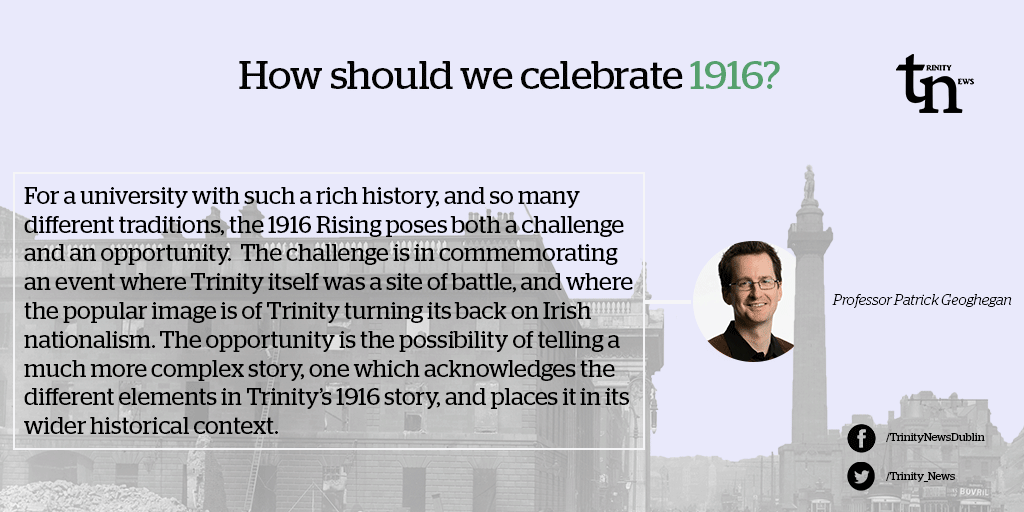Minister for Arts, Heritage and the Gaeltacht, Heather Humphreys TD recently launched Trinity’s 2016 programme of events, ‘Trinity and the Rising.’ The programme includes lectures, tours, a relaunch of the free and online MOOC run by the Department of History, the Changed Utterly blog hosted by Trinity Library, a debate hosted by the Historical Society, and a public reading of the 1916 Proclamation on the steps of the Dining Hall on March 15.
Trinity News invited a selection of the individuals taking part in these events to respond to the question of how they think 1916 might best be commemorated, and what responsibility Trinity has to Ireland’s histories. In the second installment of this series, Trinity News speaks to Professor Patrick Geoghegan.
Professor Patrick Geoghegan
Commemoration can be a tricky thing. What do you choose to remember and how? Is it the same as celebrating an event, or is it an opportunity for a critical re-examination of a particular event or period? Done right, commemoration can be a powerful way of exploring our past, but it requires a respect for different traditions, and an intellectual honesty about how it is approached. For a university with such a rich history, and so many different traditions, the 1916 Rising poses both a challenge and an opportunity. The challenge is in commemorating an event where Trinity itself was a site of battle, and where the popular image is of Trinity turning its back on Irish nationalism. The opportunity is the possibility of telling a much more complex story, one which acknowledges the different elements in Trinity’s 1916 story, and places it in its wider historical context.
Few Trinity students, for example, probably know that Patrick Pearse was a student here for a short time. It was in 1900 when he was studying to be a barrister and, although he never really fitted in, he drew inspiration from three great figures from Trinity’s past – Wolfe Tone, Robert Emmet, and Thomas Davis. People at the time were aware of the links, and during the Easter Rising a rumour raced around Dublin that Pearse’s real ambition was not to become President of an independent Irish Republic, but Provost of Trinity. Pearse may not have been welcome in Trinity in 1916 (and he was banned from speaking here in 1914), but he remains an important part of our story.
On 15 March 2016 educational institutions across the country will mark what the government is calling ‘Proclamation Day’, and there will be readings of the 1916 Proclamation, the founding document of the modern Irish state. Universities are sites of debate and critical engagement, and so on the evening of March 15 we will be hosting a symposium on the 1916 Proclamation in its global context – looking at international comparators (for example the American Declaration of Independence) – and also exploring and critiquing what the Proclamation means. The 1916 Proclamation famously refers to how ‘six times during the past three hundred years’ Ireland asserted her right to independence in arms, and we will explore why these rebellions were included and how they influenced 1916. Trinity is probably unique in being the only university with the expertise to discuss all six (or seven if we include 1916 itself), from the 1641 rebellion, through to 1798 and 1803, and on to 1916. We are looking forward to bringing together our students, staff, and alumni – those who have strong views on 1916 and those who have none – to debate and discuss one of the most important documents in modern Irish history. We hope you join us.
Patrick Geoghegan is a Professor in Modern History at Trinity College Dublin. He will take part in the Proclamation Day Symposium on March 15.







